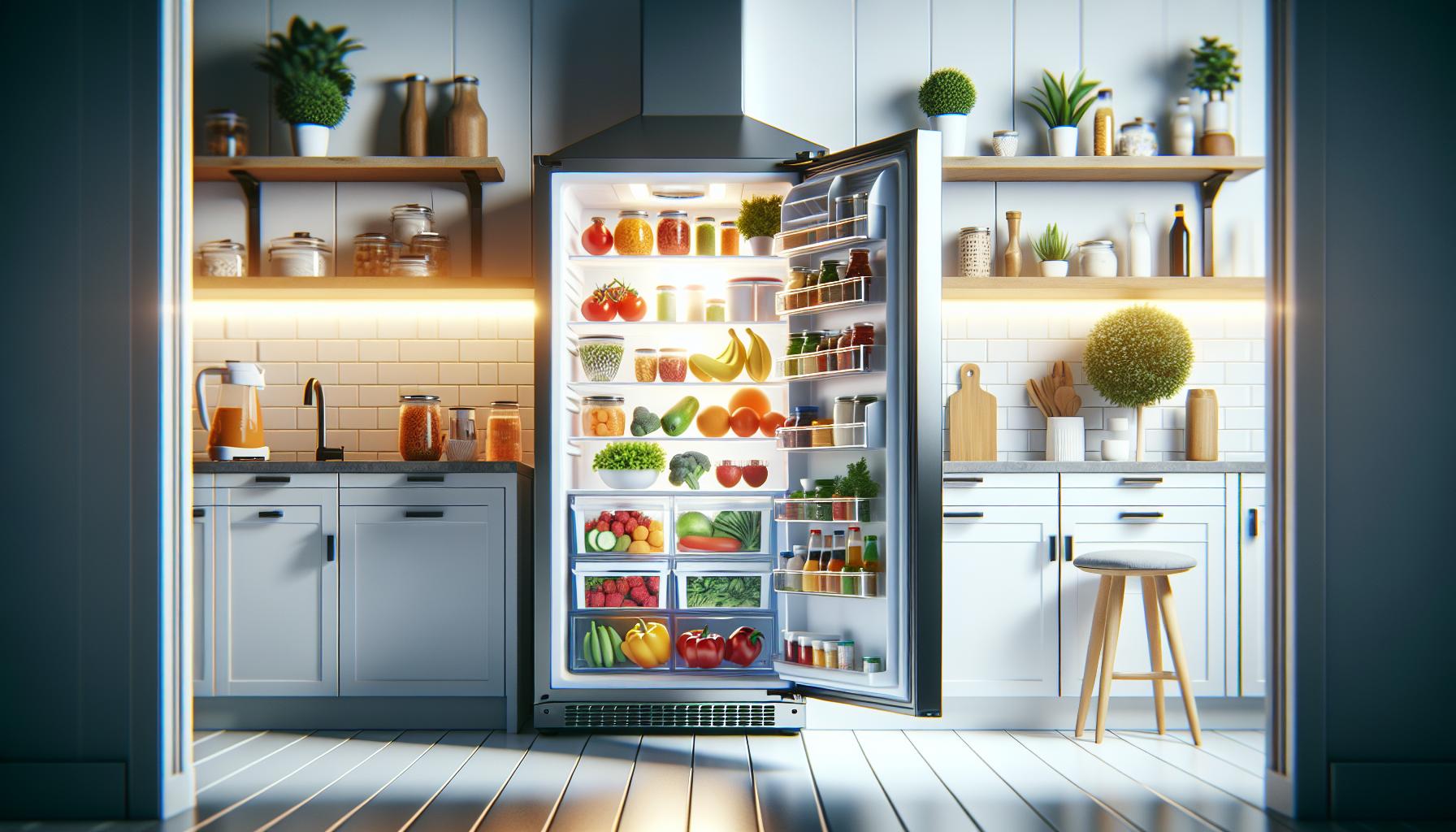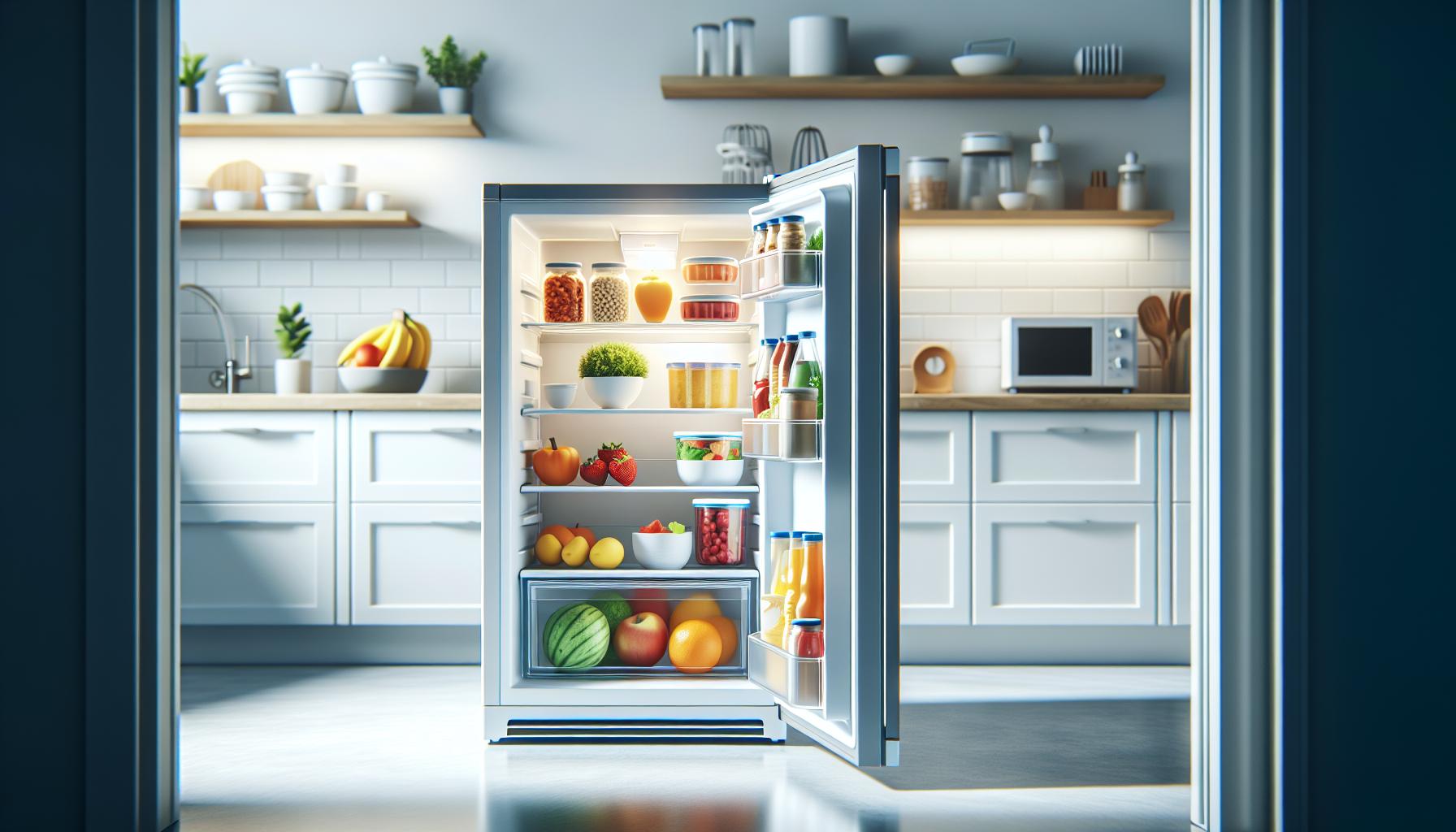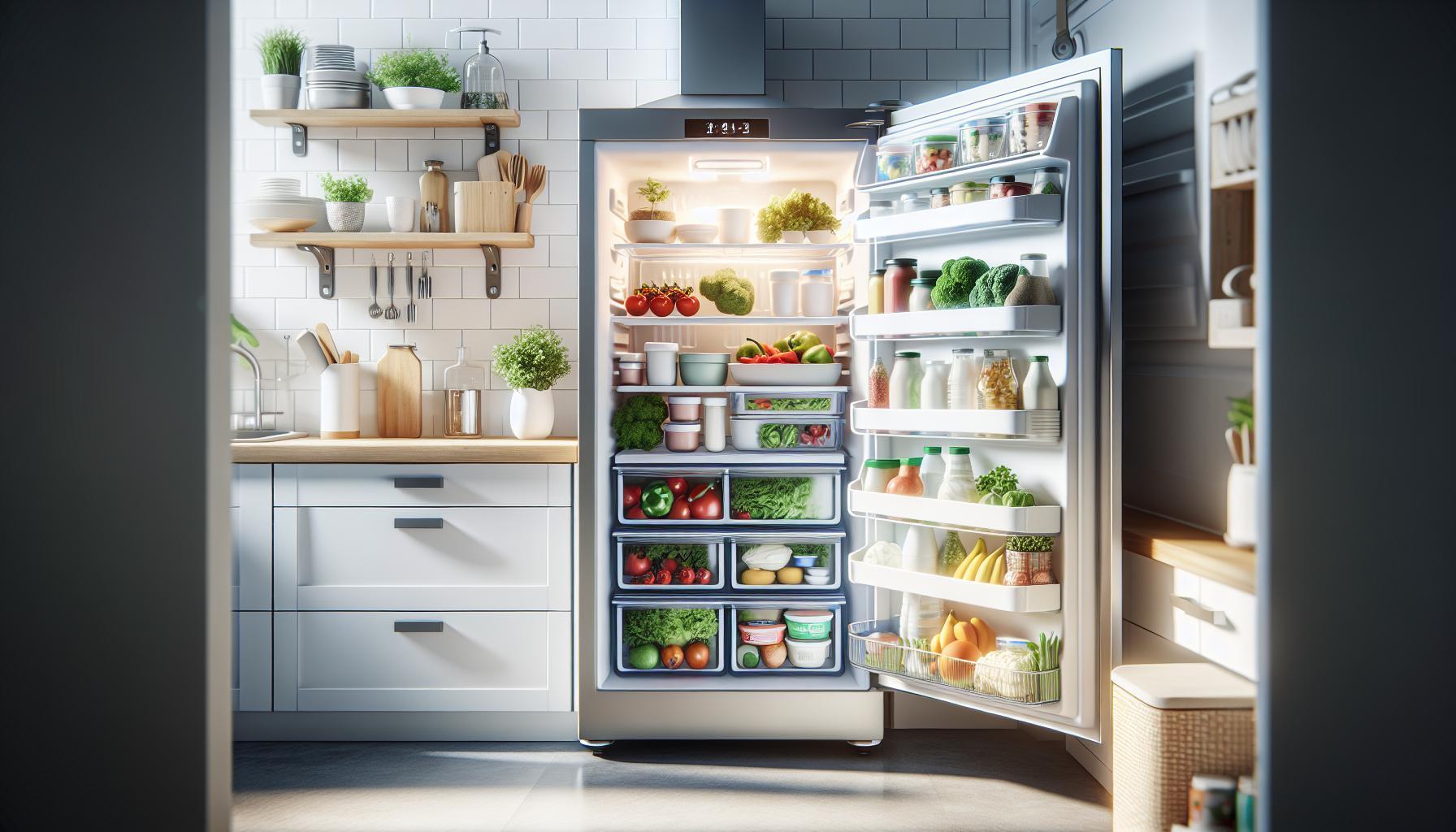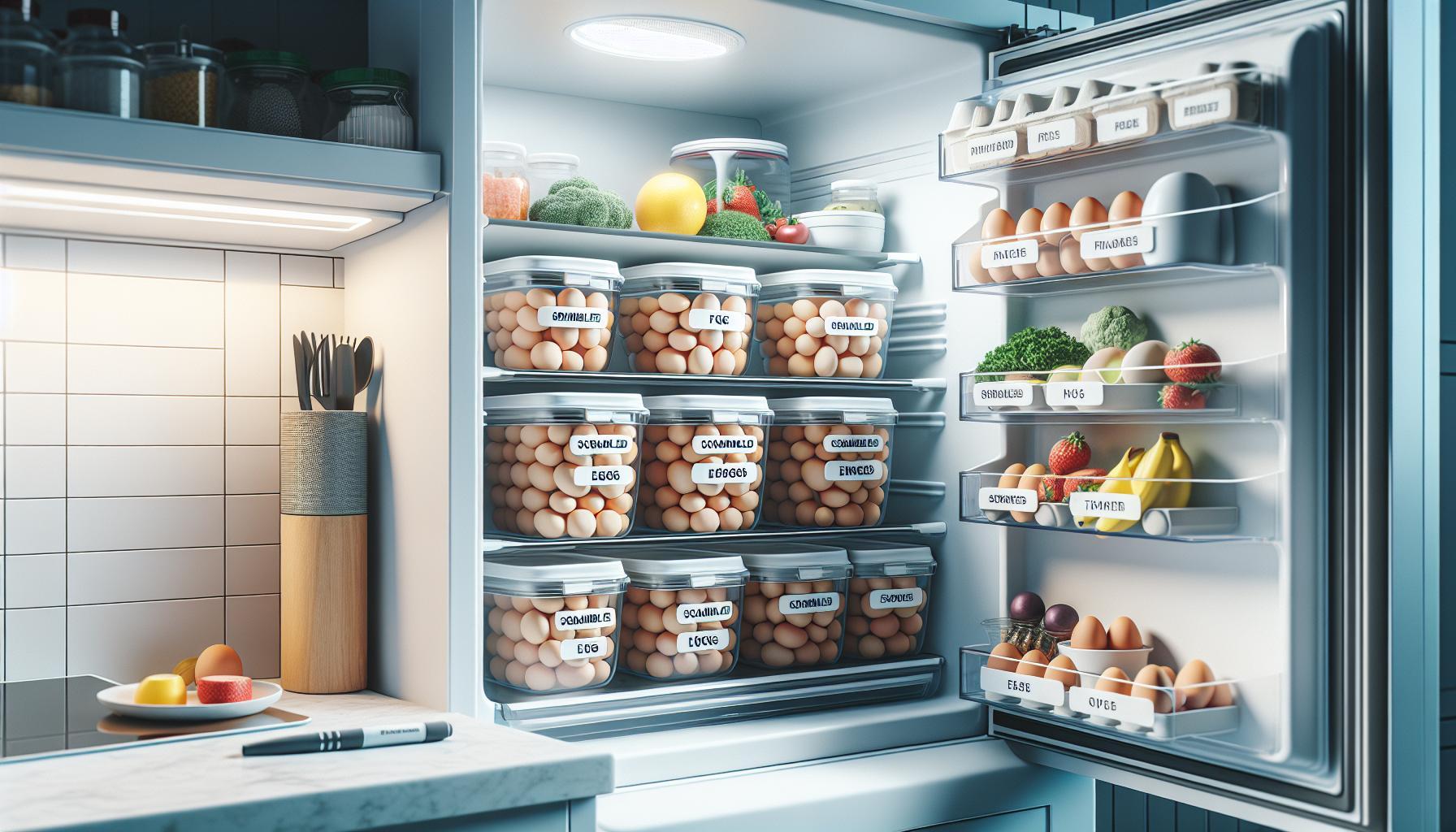Did you know that the average lifespan of a mini fridge is between 10 to 20 years? While these compact appliances are perfect for dorms, offices, or small kitchens, knowing when to replace yours is essential for food safety and efficiency. A declining performance can lead to spoiled food and higher energy bills, leaving you frustrated and potentially compromising your health.
If your mini fridge starts to make strange noises, struggles to maintain a consistent temperature, or shows significant wear and tear, it might be time for an upgrade. Understanding the signs of aging and the factors affecting longevity can help you make an informed decision about when to replace your appliance. Continue reading for practical insights on how long mini fridges last and how to ensure your food storage remains safe and effective.
How Long Do Mini Fridges Typically Last?
Mini fridges are an invaluable asset in many homes, providing convenient storage for drinks, snacks, and leftovers. Generally, a typical mini fridge can last anywhere from 5 to 10 years. However, various factors influence this lifespan, including the brand, usage, and maintenance practices. For instance, high-quality models from reputable brands tend to offer greater durability, while frequent opening and closing can lead to wear and tear that shortens their lifespan.
Proper maintenance plays a crucial role in maximizing your mini fridge’s longevity. Keeping the appliance clean, ensuring proper airflow around it, and regularly defrosting will help maintain efficient operation. The placement also matters; the fridge should be positioned away from heat sources and have sufficient space behind and around it for ventilation. Additionally, ensuring the temperature settings are optimal-typically around 37°F (3°C) for the fridge compartment and 0°F (-18°C) for the freezer-can prevent overworking the compressor, a major component that can wear out over time.
Lastly, be attentive to any unusual signs indicating your mini fridge may be nearing the end of its life. These might include excessive noise, unpredictable temperature fluctuations, or condensation buildup. By staying vigilant and implementing regular maintenance, you can ensure your mini fridge serves you reliably for years to come.
Signs Your Mini Fridge is Ripe for Replacement
It’s essential to stay alert to the subtle signs that your mini fridge may be nearing the end of its useful life. Recognizing these indicators early can prevent food spoilage and save you money in the long run. One of the most telling signs is a significant increase in noise levels. If your mini fridge begins rattling, humming loudly, or making grinding noises, it may signal that the compressor or other vital components are failing.
Temperature inconsistency is another crucial factor. If you notice that your drinks aren’t as cold as they used to be or food items are freezing when they’re supposed to be just cool, this could indicate that the cooling system is malfunctioning. Pay attention to condensation inside the fridge or on the outside surface, as excess moisture can lead to mold growth or frost accumulation, further complicating storage conditions.
Another clear indicator is age; if your mini fridge is approaching the ten-year mark, it’s wise to start preparing for a replacement. With components gradually degrading over time, it may become more cost-effective to invest in a new model rather than continuing to pour money into repairs. Lastly, if you find yourself frequently needing repairs for minor issues, this constant maintenance can become a financial burden, prompting the need for a new fridge that offers reliable performance and energy efficiency.
When evaluating whether your mini fridge is ripe for replacement, consider conducting a thorough inspection of its overall performance and condition. Keep an eye out for any significant deviations in normal operation, and don’t hesitate to act if you notice any alarming changes, ensuring that your food remains safe and your appliance operates efficiently.
Factors Affecting Mini Fridge Lifespan
The lifespan of a mini fridge can vary significantly based on several key factors that directly influence its durability and efficiency. Typically, with proper care and usage, a mini fridge may last anywhere from 5 to 10 years. However, understanding the elements that contribute to its longevity can help you maximize its lifespan and maintain optimal performance.
One of the main factors affecting a mini fridge’s lifespan is usage patterns. Frequent opening and closing can cause the compressor to work harder, leading to increased wear over time. Additionally, overloading the fridge beyond its capacity can also strain the cooling mechanism, making it less efficient and potentially leading to breakdowns. It’s advisable to keep the fridge well-stocked but not overcrowded; this allows for proper air circulation and temperature consistency.
Another critical aspect is environmental conditions. Mini fridges placed in areas with extreme temperatures-either too hot or too cold-can experience shortened lifespans because they have to compensate for ambient temperature fluctuations. Ensuring that the mini fridge is kept in a stable, moderate environment can significantly enhance its longevity. Furthermore, maintaining proper ventilation around the appliance is essential for its performance; insufficient airflow can cause overheating of internal components.
Maintenance is equally crucial in extending the life of your mini fridge. Regularly cleaning the condenser coils and ensuring that door seals are intact can prevent excessive energy consumption and mechanical strain. It’s also important to defrost the fridge if it accumulates frost build-up, as this can impede efficiency and lead to overheating. Simple preventive measures, such as checking the temperature settings occasionally and keeping it in good working condition, can go a long way.
Finally, the quality of the appliance itself plays a significant role. Higher-end brands tend to offer better materials and workmanship, which can lead to longer-lasting performance. When purchasing a mini fridge, investing in a reputable brand known for durability can yield long-term savings by reducing the frequency of repairs and replacements.
By considering these factors-usage patterns, environmental conditions, maintenance routines, and overall quality-you can significantly enhance the functionality and lifespan of your mini fridge, ensuring it serves you well for years to come.
Maintaining Your Mini Fridge for Longevity
To ensure your mini fridge serves you well for years, implementing a consistent maintenance routine is crucial. Regular upkeep not only improves efficiency but also extends the lifespan significantly. One essential practice is to clean the condenser coils every six months. Dust and debris can accumulate, reducing cooling efficiency and making the compressor work harder. A simple vacuum or a brush can help keep these coils clean, thereby reducing energy costs and wear.
Another vital aspect of maintenance involves checking the door seals. Faulty seals can cause cold air to escape, leading to fluctuating temperatures, which can compromise food safety. Inspect the seals for any cracks or tears; if you notice any, it’s best to replace them to maintain optimal performance. Additionally, regularly defrosting your mini fridge, particularly models that aren’t frost-free, can prevent the buildup of ice that affects efficiency and space.
It’s also advisable to monitor the internal temperature regularly. The ideal temperature for a refrigerator is between 35°F and 38°F (1.6°C to 3.3°C) to ensure food safety while promoting longevity. If your fridge has an adjustable thermostat, consider setting it on a cooler setting if food isn’t staying as cold as it should.
Incorporating a few easy practices can make a significant difference. Keep the fridge stocked but not overcrowded to allow proper air circulation, and avoid placing it near heat sources like stoves or direct sunlight. By following these guidelines, you’ll help maintain your mini fridge’s functionality, ensuring it not only lasts longer but also keeps your food fresh and safe.
When to Consider Repairing vs. Replacing
When faced with the decision of whether to repair or replace your mini fridge, it’s essential to evaluate a few critical factors to ensure food safety and maintain a functional kitchen environment. Typically, a mini fridge lasts around 10 years, but various issues may arise that could prompt this decision much sooner. If your fridge is consistently struggling to maintain the optimal temperature range of 35°F to 38°F (1.6°C to 3.3°C), consider whether a repair could resolve the issue or if replacement is a more viable long-term solution.
Assess the severity and frequency of the problems. Minor issues like a faulty door seal or clogged condenser coils may only require a simple repair, while a malfunctioning compressor-often one of the most expensive components to replace-could indicate it’s time for a new unit. A good rule of thumb is the 50% rule: if the repair cost exceeds half the price of a new fridge, replacement may be the more economical option.
Another consideration is the age of the fridge. If your unit is nearing the end of its lifespan and major repairs are needed, it’s often more sensible to invest in a newer, more energy-efficient model. Older refrigerators not only tend to break down more often, but they also consume more energy, which could lead to higher utility bills. Newer models may include features like improved insulation and compressors designed to enhance efficiency, ultimately saving you money in the long run.
Keep in mind that any repair should also be weighed against warranty coverage. If your mini fridge is still under warranty, repairs might be covered, allowing you to extend its life without an added financial burden. However, if the warranty has expired and you find yourself frequently calling for repairs, the stress of potential breakdowns and safety risks with food storage means it might be time to explore replacement options. Always prioritize food safety, ensuring that any food stored in an unreliable appliance remains protected from spoilage.
Understanding Warranty and Lifespan Expectations
Understanding the warranty and expected lifespan of your mini fridge is essential for making informed choices regarding its maintenance and replacement. Generally, mini fridges come with a warranty period that typically lasts from one to five years, depending on the manufacturer. This warranty often covers defects in materials and workmanship, but be aware that it usually excludes coverage for consumables, such as gaskets and shelving, which can wear out over time. Familiarizing yourself with the specifics of your warranty can alleviate concerns during issues that arise early in the fridge’s life and might provide coverage for necessary repairs.
It’s important to note that the average lifespan of a mini fridge hovers around 10 years. However, this is influenced by several factors, including the brand, usage level, and maintenance practices. Regularly scheduled maintenance-like cleaning condenser coils, ensuring proper ventilation, and checking the door seals-can significantly enhance your mini fridge’s performance and extend its lifespan.
When assessing whether to rely on the warranty for repairs, evaluate the age of the appliance. If your mini fridge is nearing the end of its expected lifespan and requires costly repairs, consider the potential benefits of investing in a newer, more energy-efficient model. New refrigerators not only save energy but also often incorporate advanced technologies that enhance temperature control and safety for food storage. Thus, knowing when to take advantage of a warranty can allow you to make more financially sound decisions for your kitchen.
Common Issues That Shorten Mini Fridge Life
Mini fridges, while convenient, can be susceptible to a range of issues that may significantly shorten their lifespan. One common problem arises from inadequate ventilation. Ensure your mini fridge isn’t placed too close to walls or other appliances, as restricted airflow can lead to overheating and increased wear on the compressor. Another frequent issue lies in the door seals. If the seals are dirty or damaged, warm air can seep in, forcing the fridge to work harder to maintain its temperature, which can lead to mechanical failure over time. Regularly inspect and clean door gaskets to maintain an effective seal.
Electrical problems can also shorten the life of a mini fridge. An unstable power supply, such as frequent surges or the use of extension cords, can damage the compressor or electronic components. Plugging your fridge directly into a wall outlet and using voltage stabilizers can help mitigate the risk. Additionally, mechanical parts, like the compressor or fans, may fail due to age or lack of maintenance. It’s essential to address unusual sounds or leaks promptly, as these could indicate serious issues that might lead to complete appliance failure.
Using your mini fridge for purposes outside of its intended design can also lead to early replacement. For instance, overloading the fridge with items can strain the compressor and impede airflow, while storing items too close to the cooling elements can cause them to freeze. Stick to recommended storage practices, typically allowing for some space around the items and keeping the fridge at the manufacturer’s suggested settings, to ensure efficient operation.
In summary, maintaining optimal conditions within and around your mini fridge is critical. Regular maintenance care-as simple as cleaning and ensuring proper ventilation-can go a long way toward extending its service life. By staying vigilant about performance and addressing issues promptly, you can significantly avoid common pitfalls that may lead to a premature replacement.
Energy Efficiency and Mini Fridge Lifespan
Mini fridges not only serve as convenient storage solutions but also play a significant role in energy consumption within your living space. The efficiency with which a mini fridge operates can greatly influence its lifespan, as well as your electricity bill. Understanding how energy efficiency impacts both the functionality and longevity of your mini fridge can help you make informed decisions about usage, maintenance, and potential upgrades.
When selecting a mini fridge, look for models that bear the Energy Star certification. These appliances are designed to consume less energy, which not only reduces greenhouse gas emissions but also lowers your operational costs. Energy-efficient models tend to operate with advanced compressors and insulation, leading to more consistent temperature management. By keeping the temperature stable, these fridges face less wear and tear, thereby extending their lifespan. Simply put, a more energy-efficient mini fridge often results in a lower risk of compressor failure and fewer repairs, allowing it to serve you reliably for many years.
To maximize energy efficiency and ensure your mini fridge lasts as long as possible, consider implementing the following practices:
- Optimal Placement: Situate your fridge in a cool, ventilated area away from direct sunlight and heat sources. Ensure there’s adequate space around the unit for airflow.
- Temperature Settings: Maintain the recommended temperature settings-typically around 37°F (3°C) for the fridge and 0°F (-18°C) for the freezer. This balance helps avoid excessive energy use without compromising food safety.
- Regular Maintenance: Clean the coils at the back or underneath the fridge at least twice a year. Dust build-up can reduce efficiency and increase energy consumption.
- Minimize Open Time: Avoid leaving the door open for extended periods, and ensure the door seals are clean and intact to prevent cold air from escaping.
By following these guidelines, you can help maintain a healthy energy profile for your mini fridge, ultimately supporting its lifespan. Remember, a well-managed appliance not only operates efficiently but also contributes to a more economical and environmentally friendly living space. With the right care, your mini fridge can remain a reliable asset in your home for a significant period, providing convenience without excessive energy costs.
Best Practices for Mini Fridge Usage
Maintaining a mini fridge properly not only ensures its longevity but also keeps your food safe and enjoyable. One critical aspect of is understanding how to organize your fridge for optimal airflow and efficiency. Packing too tightly can restrict air circulation, leading to uneven cooling and potentially spoiling your food. Arrange your items to allow air to flow freely, and make sure that the vents are not obstructed by larger items.
Another essential practice is to be mindful of temperature settings. The ideal temperature for a mini fridge should be between 35°F (1.6°C) and 38°F (3.3°C). For the best food safety, use an appliance thermometer to keep track of the temperature, ensuring it stays within this range. If you’re storing any perishables like meats or dairy, this simple habit can help prevent harmful bacteria growth, which can occur in warmer settings.
Regular cleaning is also vital to the health and efficiency of your mini fridge. Clean the interior and exterior surfaces using a mild detergent and warm water, and don’t forget to regularly check and clean the condenser coils at the back or beneath the unit. Dust and debris build-up can cause your appliance to work harder, wasting energy and potentially shortening its lifespan. Aim to clean the coils at least twice a year, or more often if you have pets or a particularly dusty environment.
To further enhance performance, keep an eye on your fridge’s door seals. Good seals ensure that cold air stays inside, while warm air stays out. Perform a simple test by closing the door on a piece of paper; if you can easily pull the paper out or feel air escaping, it’s time to replace the seals. This minor maintenance can make a significant difference in efficiency, helping your mini fridge last longer and function better.
Brands Known for Durable Mini Fridges
When choosing a mini fridge, durability is a crucial factor that can significantly impact your long-term satisfaction and food safety. Several brands have built strong reputations for crafting reliable and long-lasting mini fridges. Consider some of the most notable names that consumers trust for their quality and performance.
Top Brands for Durable Mini Fridges
- Whirlpool: Renowned for its reliability, Whirlpool mini fridges often feature robust construction and efficient cooling systems. Many users report that their units last well beyond the average lifespan, which is typically around 10 years.
- Igloo: Known for versatility and affordability, Igloo mini fridges stand out with stylish designs and solid performance. They also offer various sizes and styles, ensuring that there’s an option for almost any space.
- Danby: This brand specializes in compact appliances, and their mini fridges are celebrated for their energy efficiency and durability. Danby models tend to come with excellent warranties, which is a testament to their confidence in the product’s longevity.
- Samsung: With advanced technology and sleek designs, Samsung mini fridges offer both style and function. Their higher-end models often come equipped with features that enhance performance and user experience, contributing to a potentially longer lifespan.
- Black + Decker: Another dependable name, Black + Decker offers mini fridges that are user-friendly and built to last. These fridges score high on customer satisfaction for their reliable cooling capabilities.
When selecting a mini fridge, consider not just the brand but also the specific model features, customer reviews, and warranty options. Brands that back their products with robust warranties usually indicate a commitment to quality, further reassuring you of your investment. By choosing a reputable brand known for its durable mini fridges, you’ll be better positioned to enjoy your appliance for years to come, ensuring your food remains safe and fresh throughout its lifespan.
Cost-Benefit Analysis of Replacement Options
When contemplating whether to replace a mini fridge, it’s vital to weigh the financial implications against the practical benefits of acquiring a new unit. A thoughtful cost-benefit analysis enables informed decision-making, taking into account not only the immediate expenses but also long-term savings and potential improvements in efficiency.
First, consider the age and condition of your current mini fridge. Most units have an average lifespan of about 10 years. If your appliance is approaching this benchmark, maintenance costs, such as repairs, are likely to rise. Common issues like compressor failure or refrigerant leaks may require expensive fixes, sometimes exceeding the price of a new refrigerator. A replacement may not only reduce downtime but also improve energy efficiency, which can lower monthly utility bills. New models often feature enhanced insulation and more efficient compressors that operate with less energy, providing potential savings of 20% or more on energy costs over time.
Next, evaluate the warranty status and repair records. If your fridge is no longer covered by warranty and has a history of breakdowns, the case for replacement grows stronger. On the flip side, if it has been relatively trouble-free and a minor repair can extend its life significantly, it may be worth investing in those repairs. Reliable brands often offer warranties that reflect their confidence in the longevity of their products-consider these as part of your analysis.
Finally, think about your personal needs, such as changes in household size, lifestyle, or dietary habits. A new fridge with modern features, such as better temperature controls, compartments designed for specific food items, or smart technologies, may be well worth the investment. Upgrading to a model that aligns better with your current requirements can enhance convenience and food safety while making your daily routines more efficient. Ultimately, thoroughly analyzing these factors will guide you toward a decision that balances cost with the value of improved functionality and reliability.
Upgrading Your Mini Fridge: What to Consider
Upgrading your mini fridge can be an exciting opportunity to enhance convenience in your daily routine, particularly if your current unit is showing signs of wear or not meeting your needs. As technology advances, newer models often provide features that significantly improve food preservation and energy efficiency. When considering an upgrade, it’s essential to look at several key factors that align with your lifestyle and preferences.
One of the primary considerations should be the size and capacity of the fridge. Mini fridges come in various sizes, and choosing one that aligns with your current storage needs is crucial. For instance, if your household has expanded or if you frequently entertain guests, a larger model with adjustable shelving might be beneficial. Consider the layout of your space as well; ensuring that the new unit fits well without compromising movement is fundamental.
Another important aspect to contemplate is the energy efficiency of new models. Older fridges tend to consume more power, leading to higher electricity bills. Many modern mini fridges come with Energy Star ratings, which not only indicate lower energy consumption but also feature advanced insulation and temperature management systems. This can result in savings on your utility bills alongside a reduced environmental footprint. As a rule of thumb, an Energy Star-rated fridge can save you up to 20% in energy costs compared to older models.
Adding to your decision could be the available features that enhance usability. Features like adjustable temperature controls, built-in freezers, door bins for easy access, and even smart technology that allows monitoring and control via your smartphone can make a notable difference in your experience. Additionally, consider the warranty and support options provided by manufacturers, as a solid warranty can offer peace of mind regarding your investment.
As you explore new options, keep in mind the importance of proper food storage practices to maximize safety and quality. Make sure to check that any new model allows efficient airflow and has compartments that help in organizing food appropriately to minimize spoilage. An upgraded mini fridge should not only suit your current needs but also adapt to any future changes in your lifestyle, ensuring that you get the best value for your investment over the years.
Q&A
Q: How can I tell if my mini fridge is working efficiently?
A: To determine if your mini fridge is working efficiently, listen for unusual noises, check the temperature consistency, and inspect the door seals for airtightness. If the internal temperature fluctuates significantly or if you notice frost buildup, it may need maintenance or replacement.
Q: What is the average lifespan of a mini fridge?
A: The average lifespan of a mini fridge is typically around 10 years, depending on usage and maintenance. Factors such as brand quality, care, and frequency of use can influence how long your mini fridge will last.
Q: What are common problems that indicate a mini fridge needs replacement?
A: Common problems indicating a need for replacement include constant overheating, significant frost build-up, excessive noise, and fluctuating internal temperatures. If repairs exceed 50% of a new fridge’s cost, consider replacing it.
Q: How does energy efficiency affect the lifespan of a mini fridge?
A: Energy efficiency can impact a mini fridge’s lifespan by reducing wear and tear on compressor components. An efficient fridge runs less frequently, resulting in less stress and ultimately extending its operational life.
Q: When should you consider repairing your mini fridge instead of replacing it?
A: Repairing your mini fridge may be worth it if the issue is minor, like a faulty thermostat or a simple door seal replacement. If the cost of repair is less than 50% of a new fridge and the unit is relatively young, opt for repair.
Q: What maintenance tips can help extend the life of my mini fridge?
A: To extend your mini fridge’s life, keep the coils clean, maintain a consistent temperature, avoid overloading it, and regularly check the door seals. Additionally, defrost it periodically to enhance efficiency and performance.
Q: How can I choose a high-quality mini fridge that lasts longer?
A: Choose a high-quality mini fridge by researching reputable brands known for durability, checking customer reviews, and looking for energy-efficient models. Ensure it comes with a solid warranty, which can provide reassurance for potential future issues.
Q: What factors influence the lifespan of a mini fridge?
A: Key factors influencing the lifespan of a mini fridge include usage frequency, quality of materials, regular maintenance, and environmental factors like temperature and humidity in its surroundings. Proper care can significantly extend its life.
Key Takeaways
In conclusion, knowing the lifespan of your mini fridge can help you make informed decisions about replacement and maintenance, ensuring your food stays safe and fresh. If your mini fridge is nearing the end of its life-usually around 10 years-consider evaluating its efficiency and performance regularly. For more tips on appliance longevity, check out our guides on “How to Maintain Your Mini Fridge” and “Signs Your Appliance Needs Replacement.”
Don’t wait until it’s too late; if you notice any unusual noises, poor cooling, or excessive frost buildup, take action now! Join our newsletter for expert advice on home appliance care and check our product pages for the latest energy-efficient models. Your kitchen deserves the best-keep it running smoothly today!





